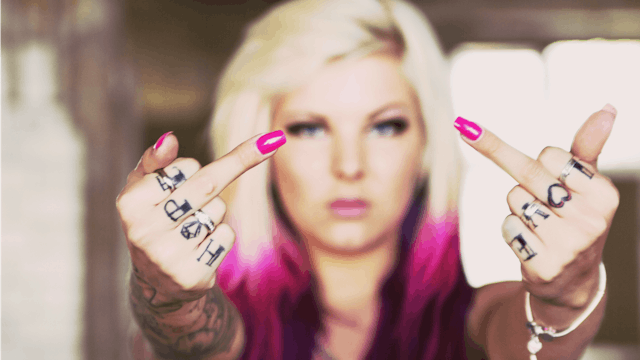In Defense Of Saying The Word 'F*ck' A Lot

I love words. Like, ridiculously love them. In fact, you might say I am kind of obsessed with them — like the graphic-tee-wearing, quotes-on-coffee-mugs, words-on-pillows, tattoo-on-my-forearm kind of obsessed. As a writer, I love nothing more than finding the perfect word, at the perfect time, to perfectly describe what I am trying to say. And sometimes the perfect word just happens to be fuck.
I realize my use of that word offends some people. It strikes a chord, I get it. But striking a chord in people is precisely why I curse.
Because words have power.
We, as a culture, have bestowed a little extra oomph on certain words, and in the case of cuss words, we’ve taken it even further and deemed them downright bad.
Bad, really? How can a word be bad? Loaded, yes. Strong, sure. Supercharged, I get it. But at the end of the day, it’s still just a word.
When I was growing up, my mother rarely swore. She’s just a tiny little bit of a thing that meditated every day and taught us to always look for the best in people. So you can imagine the reaction she’d get from us kids when an expletive emerged from her perfectly painted lips. When we were young, it immediately made us step into line — you don’t mess with an English teacher who’s mad enough to cuss. Which was exactly the point of her using those words. (Of course, by the time we were teenagers, it had the opposite effect, my 5-foot-2 manicured momma dropping an F-bomb is some funny shit).
I don’t actually throw cuss words around like a longshoreman on leave, but I do know how to use a well-placed fuck — sometimes to get a reaction, sometimes to drive home a point, and sometimes it’s just a damn good punchline.
As a lover of all things word-related, I think we should stop teaching our kids that some words are bad.
With our daughter, we have introduced the idea of strong words instead. The idea that certain words are extra-charged and may elicit a stronger reaction than others. She gets that it’s no big deal to sing along with Gwen Stefani as we’re trucking down the road: “This shit is bananas, B-A-N-A-N-A-S.” But she might want to gauge the room before sharing that particular performance with everyone in her life (like her 80-year-old grandfather for instance).
Of course, strong words can also lose their power, especially when overused. We have a friend who cusses like it’s his job, but my daughter barely even notices when his four-letter firebombs start flying.
I prefer to use my strong words more sparingly, keeping them charged and ready for when I need them. I like my cuss words like I like my coffee — strong, bold, and full of flavor — for maximum effect.
At the end of the day, I don’t want my daughter worrying about which words are bad and which ones are good. Instead, I want her to understand that words have power — to hurt, to heal, to silence, to change. They have an effect, and the stronger the word, the stronger the effect.
It is precisely this amplified power that makes strong words so impactful. And precisely why some of us just love to use them.
Oh For Fuck’s Sake, The McDonald’s New Minion Toy Is Not Saying ‘Fuck’ is a way more intriguing headline than “Parents Upset Over Possible Inappropriate Language in New McDonald’s Toy” — don’t you think?
So I’ll keep dropping my strategically targeted F-bombs and keep helping my daughter understand the power of words, so she learns to use them consciously, wisely, and for maximum fucking effect.
Know someone who loves to employ a good four-letter attention-getter? Do you engage in the art of the expletive yourself? Share this article with other conscious cussers — you’ll be so fucking glad you did.